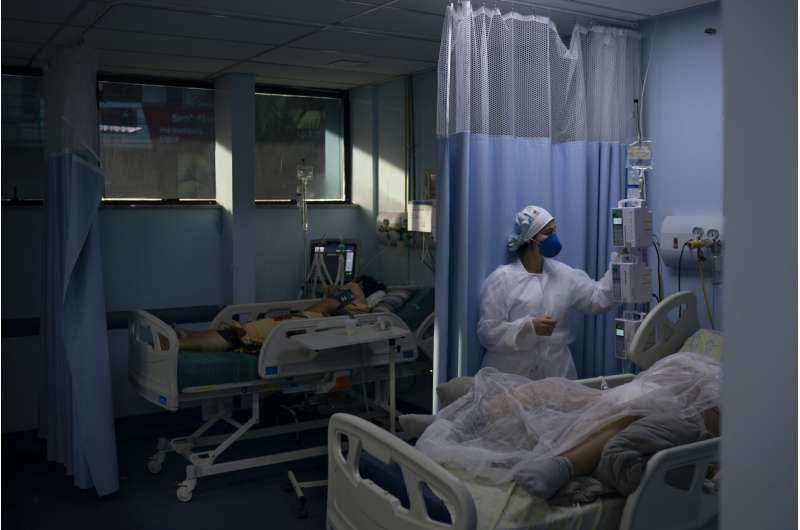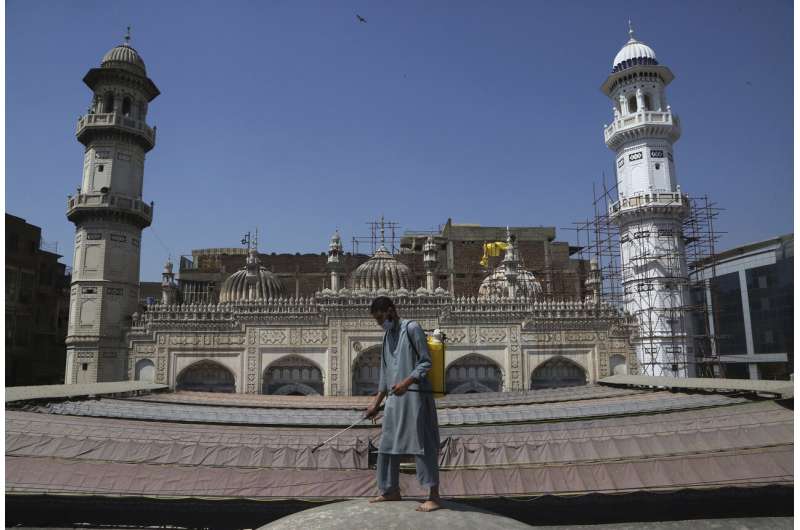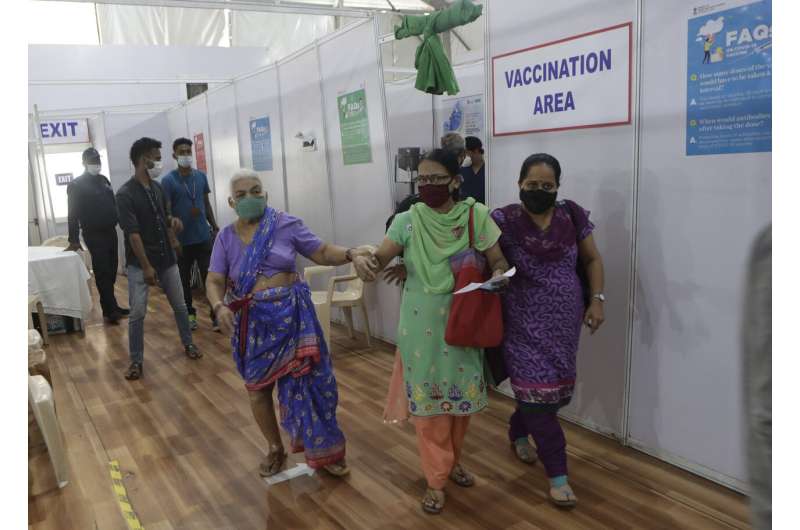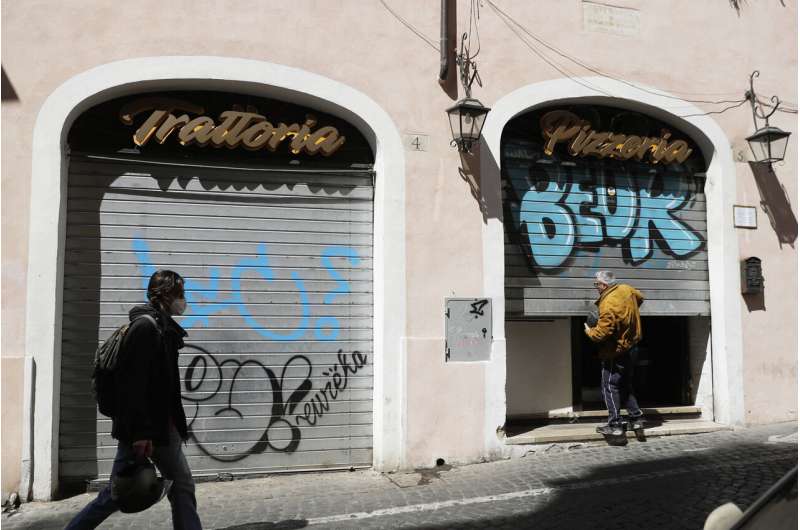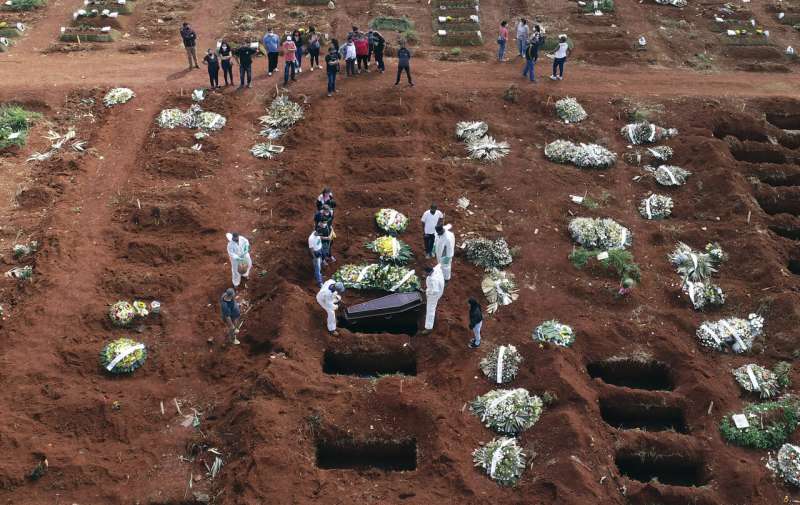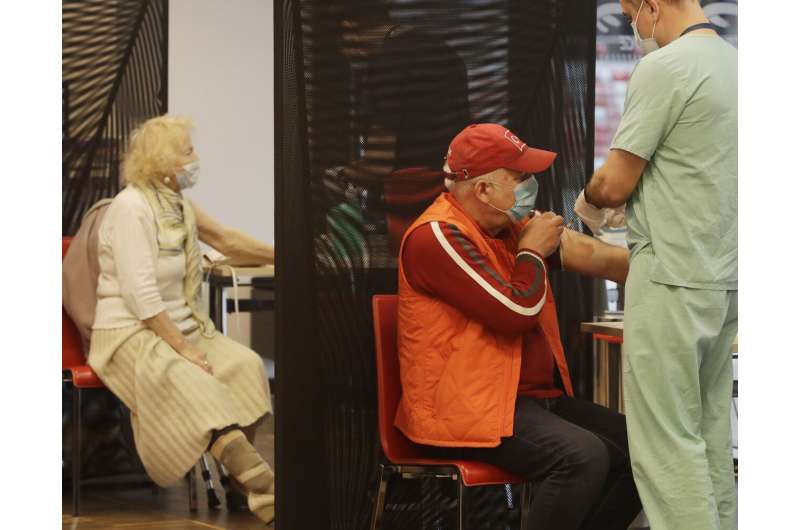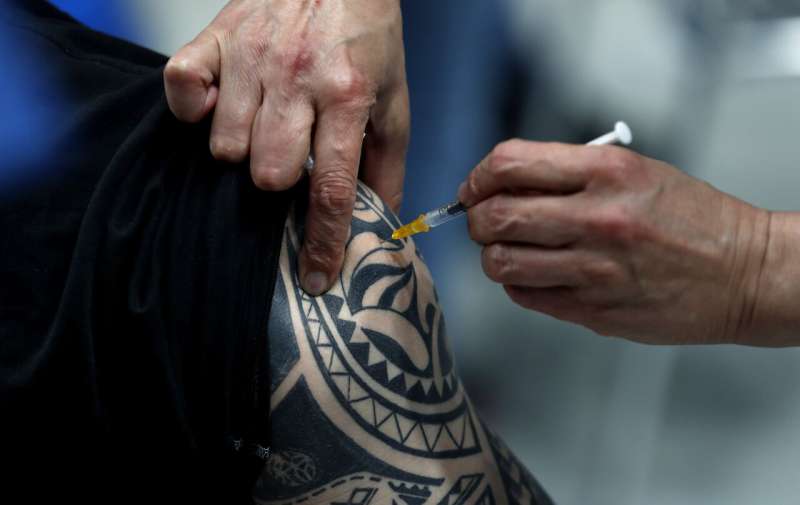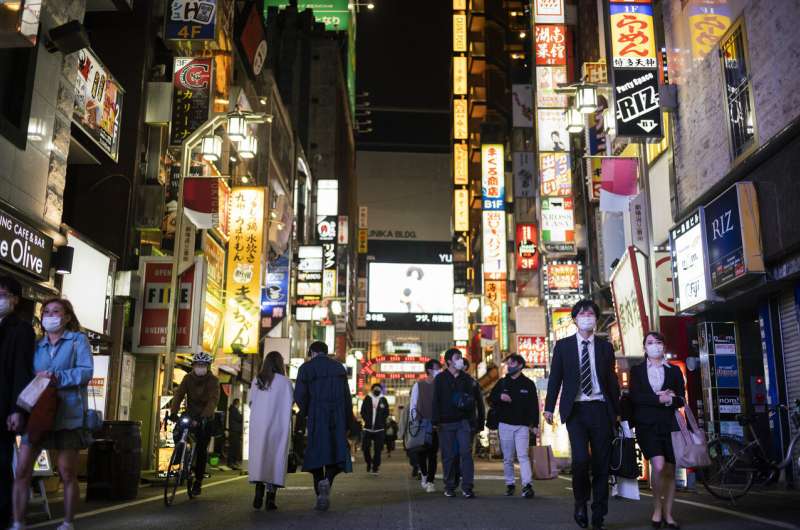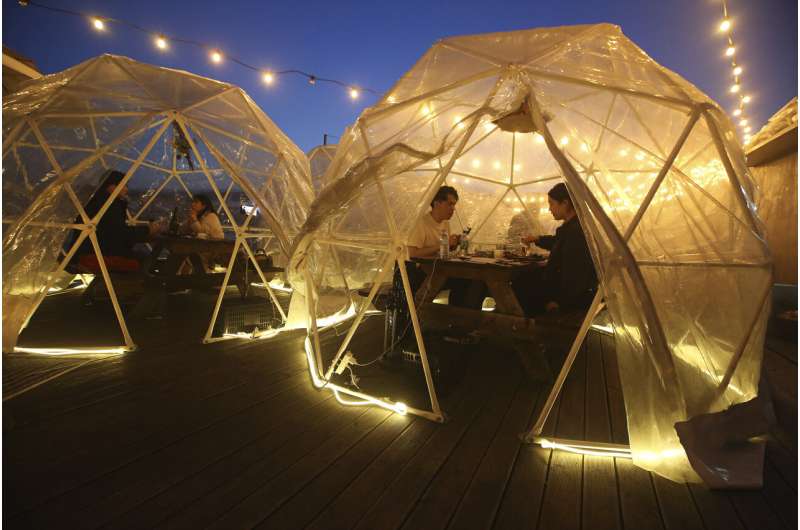COVID-19 patients are treated in the municipal hospital of Sao Joao de Meriti, Rio de Janeiro state, Brazil, Thursday, April 8, 2021. (AP Photo/Felipe Dana)
Hospitals in Turkey and Poland are filling up. Pakistan is restricting domestic travel. The U.S. government will send more help to the state with the country's worst infection increase.
The worldwide surge in coronavirus cases and deaths includes even Thailand, which has weathered the pandemic far better than many nations but now struggles to contain COVID-19.
The only exceptions to the deteriorating situation are countries that have advanced vaccination programs, most notably Israel and Britain. The U.S., which is a vaccination leader globally, is also seeing a small uptick in new cases, and the White House announced Friday that it would send federal assistance to Michigan to control the state's worst-in-the-nation transmission rate.
The World Health Organization said infection rates are climbing in every global region, driven by new virus variants and too many countries coming out of lockdown too soon.
"We've seen rises (in cases) worldwide for six weeks. And now, sadly, we are seeing rises in deaths for the last three weeks," Dr. Margaret Harris, a WHO spokeswoman, said at a briefing in Geneva.
In its weekly epidemiological update, the WHO said over 4 million COVID-19 cases were reported in the last week. New deaths increased by 11% compared to last week, with over 71,000 reported.
A volunteer disinfects the outer area of a historical Mohabat Khan mosque ahead of the upcoming Muslim fasting month of Ramadan, in Peshawar, Pakistan, Friday, April 9, 2021. (AP Photo/Muhammad Sajjad)
The increasing infections, hospitalizations and deaths extend to countries where vaccinations are finally gaining momentum. That leaves even bleaker prospects for much of the world, where large-scale vaccination programs remain a more distant prospect.
In Turkey, which is among the badly hit countries, most new cases of the virus can be traced to a variant first found in Britain.
Ismail Cinel, head of the Turkish Intensive Care Association, said the surge was beginning to strain the nation's relatively advanced health care system and "the alarm bells are ringing" for intensive care units, which are not yet at full capacity.
"The mutant form of the virus is causing more harm to the organs," Cinel said. "While 2 out of 10 patients were dying previously, the number is now 4 out of 10. And if we continue this way, we will lose six."
A woman leaves after receiving her second dose of the COVID-19 vaccine at a vaccination center that is closed for fresh registrations for first doses because of shortage the vaccine, in Mumbai, India, Friday, April 9, 2021. India has a seven-day rolling average of more than 100,000 cases per day and has reported 13 million virus cases since the pandemic began, the third-highest total after the United States and Brazil. (AP Photo/Rajanish Kakade)
Turkish President Recep Tayyip Erdogan eased COVID-19 restrictions in early March to minimize pain to his nation's ailing economy. The new spike forced him to announce renewed restrictions, such as weekend lockdowns and the closure of cafes and restaurants during Ramadan, which starts April 13.
Turkish medical groups say the reopening in March was premature and that the new measures do not go far enough. They have been calling for full lockdowns during the holy Muslim month.
In the U.S. capital, President Joe Biden's administration outlined how the federal government planned to help Michigan better administer the doses already allocated to the state, as well as expand testing capacity and the availability of drugs. The effort will not include any extra vaccine doses, a move Gov. Gretchen Whitmer sought.
A man opens the shutter of a Restaurant in Rome, Friday, April 9, 2021. Italy has seen a stabilizing of the new variant-fueled infections over the past three weeks, though its daily death count remains stubbornly high, averaging between 300-500 COVID-19 victims per day, and its ICU capacity for virus patients is well over the threshold set by the government. (AP Photo/Gregorio Borgia)
Doses are currently allocated to states proportionally by population. Whitmer has called for extra doses to be shifted to states like hers experiencing a sharp rise in cases. She also urged a voluntary two-week halt to in-person high school classes, youth sports and indoor restaurant dining, but stopped short of issuing new restrictions.
In Brazil, which has the second-highest death toll in the world after the U.S., Sao Paulo has started night burials to cope with demand, and school vans have been used to transport coffins. With the pace of vaccination already slow—less than than 3% of Brazil's 210 million people have received both vaccine doses, according to the research site Our World in Data—some governors have expressed concern about vaccine supplies.
The death toll in Iran is also rising, prompting new restrictions that will take effect for 10 days in 257 cities beginning Saturday. They involve the closure of all parks, restaurants, confectionaries, beauty salons, malls and bookstores.
Palestinians practice outdoor social distancing while attending the last Friday prayers ahead of the upcoming Muslim fasting month of Ramadan, at a parking lot in the West Bank city of Ramallah, Friday, April 9, 2021. The West Bank welcomes Ramadan this year while under lockdown measures, due to a surge in COVID-19 cases, that includes restrictions on mosques indoor mass prayers. (AP Photo/Nasser Nasser)
Authorities in Pakistan, which is in the middle of a third surge of infections, are restricting inter-city transportation on weekends starting at midnight Friday.
Elsewhere in Asia, authorities in Thailand ordered new restrictions Friday in an effort to contain a growing coronavirus outbreak just days before the country's traditional Songkran New Year's holiday, when millions of people travel.
In Germany, Poland and other countries in the 27-member European Union, vaccination programs are finally ramping up after a slow start blamed on delivery shortages.
Thousands of German medical practices joined the vaccination campaign this week, helping the country reach consecutive daily records for doses administered. So far, 14.7% of the population has received at least one dose and 5.8% has received both shots.
-
Cemetery workers wearing protective gear lower the coffin of a person who died from complications related to COVID-19 into a gravesite at the Vila Formosa cemetery in Sao Paulo, Brazil, Wednesday, April 7, 2021. The city of Sao Paulo started the daily addition of 600 graves in its municipal cemeteries on Wednesday. (AP Photo/Andre Penner)
-
People getting their COVID-19 jabs at a temporary vaccination center at the National Stadium in Warsaw, Poland, Wednesday, April 7, 2021 as the government is stepping up the tempo of nationwide inoculation. New regulations brought order into the vaccination procedure at the stadium center, after a crowd and long lines formed there on Tuesday. (AP Photo/Czarek Sokolowski)
-
A tattooed person gets Pfizer vaccine at the National vaccination center in Prague, Czech Republic, Friday, April 9, 2021. On Friday the center, that is the biggest in the country, held its final trials before being able to vaccinate up to 10 000 people a day. (AP Photo/Petr David Josek)
-
People walk through a street filled with entertainment, restaurants and bars in the Shinjuku neighborhood of Tokyo on Friday, April 9, 2021. Japan announced Friday that it will raise the coronavirus alert level in Tokyo to allow tougher measures to curb the rapid spread of a more contagious variant ahead of the Summer Olympics. (AP Photo/Hiro Komae)
-
People enjoy outdoor dining at plastic bubbles, observing social distancing against the spread of the coronavirus at a restaurant near the Han River in Seoul, South Korea, Friday, April 9, 2021. (AP Photo/Ahn Young-joon)
Yet German health officials are warning of a steep rise in intensive care patients and are calling for stronger action to contain infections.
Neighboring Poland is also seeing a dramatic spike in deaths, and hospitals have been forced to turn away cancer and other patients as ICU and other hospital beds are taken by COVID-19 patients. Hospitalizations of virus patients there have jumped 20% in the past two weeks.
Harris, from the WHO, said the world knows how to fight these surges. She cited good news from the U.K., where new coronavirus cases dropped 60% in March amid a strong vaccination program, "but we have to do it all."
"We have to keep on social distancing. We have to avoid indoor crowded settings," she said. "We have to keep wearing the masks, even if vaccinated."
© 2021 The Associated Press. All rights reserved. This material may not be published, broadcast, rewritten or redistributed without permission.
